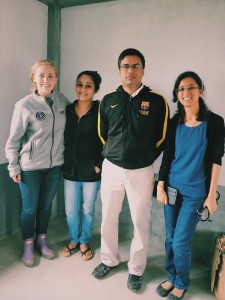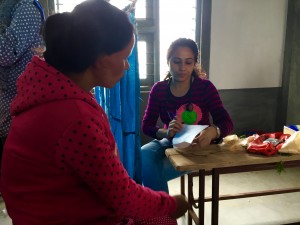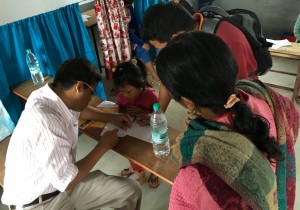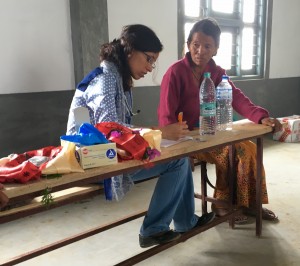From left to right: Morgan Moses, Dr. Anjali Rasaili, Dr. Ramesh Shrestha, Dr. Tulasa Basnet
Dr. Anjali Rasaili
Dr. Rasaili has been an OBGYN specialist at Doctor To You for two years and has been a doctor for the last six. She prefers the surgical aspect that accompanies gynecology over obstetric cases. With a glimmer in her eye, she told me looks forward to performing laparoscopic operations in the future, which will come once her career advances. (Fun fact: Dr. Karki, who we met in Biratnagar earlier in my adventure, is an expert in laparoscopy.) Dr. Rasaili praised the health camp, and said it allowed her to provide a service to society and the women of the Nepali community, which is something that is very important to her.
Dr. Ramesh Shrestha
Dr. Ramesh Shrestha has been an OBGYN specialist for two years and has been a doctor for the last six. When asked about his professional opinions regarding uterine prolapse, he spoke about how common the medical issue is in the Nepali community. Dr. Shrestha believes the prevalence is underestimated due to the lack of women who seek medical attention. While the hospital data reports a 5 percent prevalence rate in Nepal, he believes the rate of women suffering from 2nd to 4th degree prolapse (most in the 2nd and 3rd degree) may reach between 20 and 30 percent in the community. With such a daunting problem facing the women of Nepal, Dr. Shrestha suggests that increasing the availability of family planning resources and methods (as well as adequate knowledge about these resources and methods) may be the best preventative care for women in these smaller communities. There are other risk factors that many women of Nepal are exposed to including the complications that accompany giving birth to multiple children and the intense physical strain placed on the body by hard labor such as farming.
Dr. Tulasa Basnet
Dr. Tulasa Basnet has been an OBGYN specialist for two months and has been a doctor for the last four. She spent time working in the Kathmandu Teaching Hospital where women who had uterine prolapse were treated for free. Because of this, one to two women would undergo surgery for their uterine prolapse per day at the hospital. The cases would vary, but some were very bad and included rectal prolapse, bladder prolapse, and/or ulcers on the uterus – similar to what we saw at the health camp. When she asked if she likes her specialty, she smiled and said she prefers obstetrics because there are so many good moments. There’s grateful, smiling patients and she gets to experience the intense joy of delivering a baby and handing it over to a new, loving mother.
Posted By Morgan Moses
Posted Aug 27th, 2016





